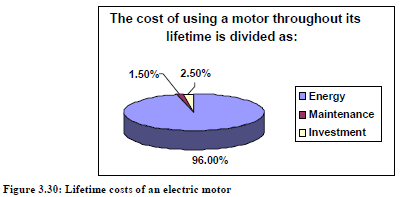
3.6.3 Variable speed drives
The adjustment of the motor speed through the use of variable speed drives (VSDs) can lead to significant energy savings associated to better process control, less wear in the mechanical equipment and less acoustical noise. When loads vary, VSDs can reduce electrical energy consumption particularly in centrifugal pumps, compressors and fan applications − typically in the range of -4 − 50 %. Materials processing applications like centrifugal machines, mills and machine tools, as well as materials handling applications such as winders, conveyors and elevators, can also benefit both in terms of energy consumption and overall performance through the use of VSDs.
The use of VSDs can also lead to other benefits including:
●extending the useful operating range of the driven equipment
●isolating motors from the line, which can reduce motor stress and inefficiency
●accurately synchronising multiple motors
●improving the speed and reliability of response to changing operating conditions.
VSDs are not applicable for all applications, in particular where the load is constant (e.g. fluid bed air input fans, oxidation air compressors, etc.), as the VSD will lose 3 - 4 % of the energy input (rectifying and adjusting the current phase).
3.6.4 Transmission losses
Transmission equipment including shafts, belts, chains, and gears should be properly installed and maintained. The transmission system from the motor to the load is a source of losses. These losses can vary significantly, from 0 to 45 %. When possible, use synchronous belts in place of V-belts. Cogged V-belts are more efficient than conventional V-belts. Helical gears are much more efficient than worm gears. Direct coupling has to be the best possible option (where technically feasible), and V-belts avoided.
3.6.3 變速裝置
利用變速裝置來調整馬達轉速可得到節能、運轉滑順、減少設備機械磨損及降低噪音的好處。當負載變化時,VSD可配合減少約4~50%的電能耗用,尤其是離心泵浦、壓縮機及風車等。生產進料處理的設備,如離心機、研磨機及進料運送設備,如絞車、輸送帶、升降機等,透過VSD的使用可以獲得能耗降低與整體績效提升的好處。
使用VSD也可得到下列效益:
●擴大被動設備的有用操作範圍
●從作業線上分離馬達,可減少馬達運轉應力和無效率
●準確地使多部馬達同步運轉
●改善運轉速度及對應操作條件改變的可靠度
VSD並非可用在所有設備,尤其是設備負載恆定時(例如流體化床送空氣風車、氧化反應的空氣壓縮機等),因為VSD要整流及調整電流相位會損失3~4%的能源投入。
3.6.4 動力傳動損失
動力傳動設備包括傳動軸、傳動皮帶、傳動鏈條、傳動齒輪等設備必須適當地安裝與維護保養。基本上,從馬達透過傳動系統將動力傳到負載端就已經是能量的損失。這些動力損失約在0~45%間,相當可觀。所以盡量用同步傳動皮帶替代V型三角皮帶;齒型三角皮帶會比傳統的V型三角皮帶有效果;螺旋齒輪會比蝸齒輪更具效能;若在技術上可行,直接連結是最佳選擇,而應避免使用V型三角皮帶。
Harmonics caused by speed controllers, etc. cause losses in motors and transformers ( see Section 3.5.2). An EEM takes more natural resources (copper and steel) for its production.
●運轉控制器形成的諧波造成馬達和變壓器損失
●高效型馬達生產時需耗用更多的自然資源(銅、鐵)
Electric motor drives exist in practically all industrial plants, where electricity is available.
The applicability of particular measures, and the extent to which they might save money, depend upon the size and specific nature of the installation. An assessment of the needs of the entire installation and of the system within it can determine which measures are both applicable and profitable. This should be done by a qualified drive system service provider or by qualified in-house engineering staff. In particular, this is important for VSDs and EEMs, where there is a risk of using more energy, rather than savings. It is necessary to treat new drive application designs from parts replacement in existing applications. The assessment conclusions will identify the measures which are applicable to a system, and will include an estimate of the savings, the cost of the measure, as well as the payback time.
For instance, EEMs include more material (copper and steel) than motors of a lower efficiency. As a result, an EEM has a higher efficiency but also a lower slip frequency ( which results in more rpm) and a higher starting current from the power supply than a motor of standard efficiency. The following examples s how cases where using an EEM is not the optimum solution:
●when a HVAC system is working under full load conditions, the replacement of an EEM increases the speed of the ventilators ( because of the lower slip) and subsequently increases the torque load. Using an EEM in this case brings about higher energy consumption than by using a motor of standard efficiency. The design should aim not to increase the final rpm
●if the application runs less than 1000 − 2000 hours per year (intermittent drives), the EEM may not produce a significant effect on energy savings (see Economics, below)
●if the application has to start and stop frequently, the savings may be lost because of the higher starting current of the EEM
●if the application runs mainly with a partial load (e.g. pumps) but for long running times, the savings by using EEM are negligible and a VSD will increase the energy savings.
只要在有電力可用的地方,用電動馬達作為動力帶動在產業界是相當普遍的。
電動馬達的應用性及節省的成本要看設施的特性和規模而定。針對整體設施及系統需求評估,以決定其引入方法之可行性及價值。這項評估可由品質管理系統服務機構或由公司內部工程部門人員進行。
尤其是像變速設備(VSD)和能效型馬達(EEM)的使用有能耗更大而無法省能的風險,因此必須慎重。在更換現有設備零件時有必要採用新驅動設備。評估結果可用來研判何種方法可應用於系統中,及投入成本、節省成本、回收年限等資訊。
例如高能效型馬達(EEM)要用比低效型馬達更多的銅鐵材料,結果EEM雖有較高效率,但同時會有較低的轉差頻率(slip freq.)造成馬達轉速加快,以及比標準型馬達需要更大的起動電流。
以下有些例子說明不適合使用EEM的情況:
●當一套全載運轉的空調系統換裝EEM會因為低轉差頻率而增加通風器的轉速,進而增加轉動扭矩負荷。因此,使用EEM反而較標準型馬達更耗能,這設計不應該用來增加最後的轉速。
●如果設備每年運轉時數少於1000~2000小時,裝設EEM無法有顯著的節能效果。
●若設施必須經常性起停,可能會因EEM需要高起動電流而無法節省費用。
●若設施主要運轉模式為長時間半載運轉(如泵浦),使用EEM的節省幅度微乎其微,還不如用VSD可以省能。
The price of an EEM motor is about 20 % higher than that of a conventional one Over its lifetime, approximate costs associated with operating a motor are shown in Figure 3.30:

When buying or repairing a motor, it is really important to consider the energy consumption and to minimise it as follows:
●payback period can be as short as 1 year or less with AC drives
●high efficiency motors need a longer payback on energy savings.
能效型馬達較傳統型價格高約20%,其使用年限、操作成本如圖3.30。
當考慮要新購或修理馬達時要慎重地考量能效和下列事項:
●交流驅動馬達的回收年限可低於一年
●高效率馬達在能源節省上需要較長的回收年限
Energy Efficiency (2009) 3.6.3、3.6.4
